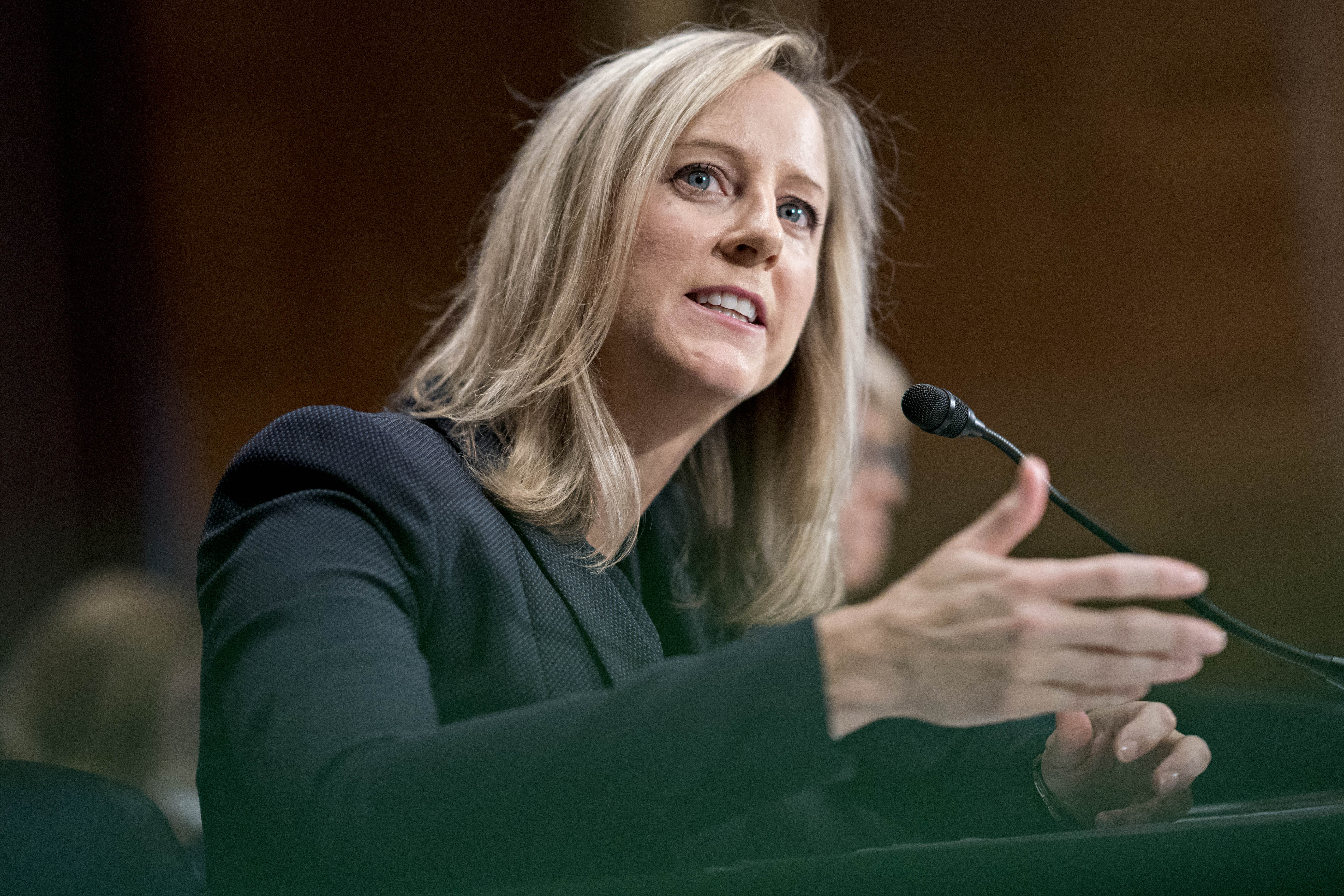Kathy Kraninger, director of the Consumer Financial Protection Bureau.
Andrew Harrer | Bloomberg | Getty Images
The agency created in the wake of the 2008 financial crisis to protect consumers from abuse is being gutted from the inside, according to some consumer advocates and legal experts.
A new enforcement policy at the Consumer Financial Protection Bureau is the most recent example of an agency drifting away from its mission to police Wall Street’s bad actors, these advocates say.
The CFPB announced Jan. 24 that it is changing the way it oversees and punishes abusive practices by financial firms. Perhaps most significantly, the watchdog will impose financial penalties, such as fines, in more limited circumstances and will require a cost-benefit analysis before investigating wrongdoing.
The agency claims its new rules will benefit both consumers and the financial services industry, yet some believe its actions amount to a handout that will allow banks, loan issuers and other financial institutions to prey on the public more easily.
“They make it more likely financial services firms will escape enforcement for wrongdoing,” said Patricia McCoy, a law professor at Boston College Law School. “It’s more likely [firms] will get a free pass.”
More from Personal Finance
Here’s why getting a raise can actually hurt your retirement
Here’s how to financially prepare for the worst-case scenario
Tax season is here! What you need to make it easy
Congress created the CFPB a decade ago when it passed the Dodd-Frank financial reform law, giving it broad powers to issue and enforce consumer protection rules.
At that time, the country was beginning to emerge from the 2008 financial crisis, which was perpetuated by irresponsible lending practices that reverberated across the U.S. and global economies.
The agency has recovered more than $12 billion for consumers to date.
Enforcement activity at the watchdog has lagged under the Trump administration.
The number of public enforcement cases announced in 2018 was down 80% from the bureau’s peak in 2015, according to a report published in March by the Consumer Federation of America, a consumer advocacy group.
President Donald Trump installed Mick Mulvaney as the agency’s acting director in 2017, replacing Obama-era appointee Richard Cordray, who stepped down before the end of a five-term term.
Trump appointee Kathy Kraninger, who worked under Mulvaney at the White House budget office, has served as director since 2018.
A case before the Supreme Court could ultimately deem the financial watchdog unconstitutional.
Some fear the agency’s newest policy could further slow enforcement.
“This is one more step along the path of de-fanging the consumer watchdog,” said Christopher Peterson, a senior fellow at the Consumer Federation of America and a law professor at the University of Utah.
However, some groups applaud the agency’s new policy.
“[It] will assist consumers as well as financial institutions working to meet their customers’ needs by offering safe and sound banking products within a well-regulated industry,” said Richard Hunt, president and CEO of the Consumer Bankers Association, a trade group for retail banks. “We applaud the bureau for issuing this statement that provides regulatory clarity.”
Dodd-Frank gave the CFPB power to police firms for unfair, deceptive and abusive financial practices. The bureau’s new policy changes criteria governing how it can investigate or penalize firms under the “abusiveness” standard.
The policy, which took effect Jan. 24, imposes a new cost-benefit analysis on the agency stipulating that the harm to consumers caused by a firm’s conduct must outweigh the benefits to consumers in order to police that behavior.
The policy also restricts the watchdog from labeling a financial practice as abusive if the bureau has already also labeled it as deceptive or unfair, and raises the bar for consumers to prove abusive conduct to the agency, said McCoy.
The CFPB also generally won’t seek monetary fines or require financial firms to forfeit ill-gotten gains from abusive practices if they made a “good-faith effort” to follow the rules.
The latter change is perhaps most significant, said McCoy, a former CFPB official who oversaw its mortgage policy initiatives. That’s because the fear of having to pay steep monetary penalties is what often keeps would-be bad actors at bay, she said.
Taken as a whole, the new policy will “gut” many of Dodd-Frank’s consumer protections and “will only encourage bad actors to engage in the reckless anti-consumer behavior that led to the financial crisis,” said Rep. Maxine Waters, D-Calif., chairwoman of the House Financial Services Committee.
Congresswoman Maxine Waters.
Sarah Morris
Changing the “abusiveness” standard was necessary to reduce uncertainty for financial firms confused by how to approach the new legal standard, according to CFPB officials.
That confusion, they said, could prevent or deter firms from offering helpful services to consumers.
“We’ve developed a policy that provides a solid framework to prevent consumer harm while promoting the clarity needed to foster consumer beneficial products as well as compliance in the marketplace,” Kraninger said.
Some experts view the policy as a quasi-win for consumer advocates, since the new policy isn’t technically a new regulation but a rule that could be overturned easily by a new agency head. However, the CFPB did hint at the possibility of implementing a formal regulation in the future, which would be more difficult to overrule in the future.
The announcement doesn’t amount to much since it essentially codifies the agency’s existing practice, according to Adam Levitin, a professor at Georgetown Law School.
“The announcement confirms what’s already been going on,” Levitin said. “The bureau hasn’t been doing much enforcement at all.”
